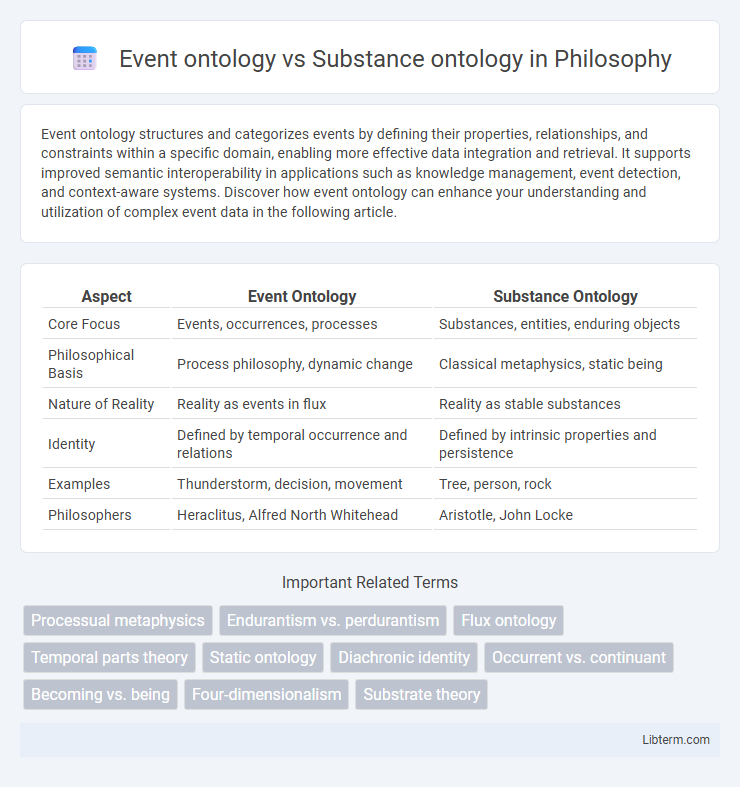Event ontology structures and categorizes events by defining their properties, relationships, and constraints within a specific domain, enabling more effective data integration and retrieval. It supports improved semantic interoperability in applications such as knowledge management, event detection, and context-aware systems. Discover how event ontology can enhance your understanding and utilization of complex event data in the following article.
Table of Comparison
| Aspect | Event Ontology | Substance Ontology |
|---|---|---|
| Core Focus | Events, occurrences, processes | Substances, entities, enduring objects |
| Philosophical Basis | Process philosophy, dynamic change | Classical metaphysics, static being |
| Nature of Reality | Reality as events in flux | Reality as stable substances |
| Identity | Defined by temporal occurrence and relations | Defined by intrinsic properties and persistence |
| Examples | Thunderstorm, decision, movement | Tree, person, rock |
| Philosophers | Heraclitus, Alfred North Whitehead | Aristotle, John Locke |
Introduction to Ontology in Philosophy
Event ontology centers on occurrences and processes as fundamental elements of reality, emphasizing temporal dynamics and change. Substance ontology prioritizes enduring entities or substances as the primary units of existence, focusing on stable, intrinsic properties. In philosophy, understanding ontology involves analyzing these metaphysical categories to explain how reality is structured and persists over time.
Defining Event Ontology
Event ontology defines reality based on occurrences or happenings that unfold over time, emphasizing temporal dynamics and processes rather than static entities. It categorizes reality through events as fundamental units, dealing with changes, states, and interactions in a structured temporal framework. This contrasts with substance ontology, which focuses on enduring substances or objects as the primary constituents of existence.
Defining Substance Ontology
Substance ontology defines entities as continuous, enduring substances that possess properties and exist independently of events or changes. It emphasizes stable, self-sufficient objects or things, distinguishing them from dynamic occurrences or processes found in event ontologies. This approach is fundamental in metaphysics for categorizing reality based on persistent entities rather than transient events.
Historical Background of Both Ontologies
Event ontology and substance ontology originate from distinct philosophical traditions, with substance ontology tracing back to Aristotle's concept of substances as fundamental entities possessing properties. Event ontology gained prominence in 20th-century analytic philosophy, influenced by process philosophy and the work of philosophers like Alfred North Whitehead, who emphasized becoming and change over static entities. Both ontologies have evolved through historical debates on the nature of reality, influencing fields such as metaphysics, linguistics, and computer science by providing frameworks to model existence either as enduring substances or as dynamic events.
Core Principles of Event Ontology
Event ontology centers on occurrences or processes as fundamental units of reality, emphasizing temporal and dynamic aspects, while substance ontology prioritizes enduring entities or objects with fixed properties. Core principles of event ontology include the conceptualization of events as spatiotemporal wholes with identifiable boundaries, the irreducibility of events to substances, and the relational dependence of events on participants and contexts. This framework supports modeling change, causality, and the flow of time more effectively than substance ontology, capturing the complexity of dynamic phenomena.
Core Principles of Substance Ontology
Substance ontology centers on the core principle that reality consists of enduring substances with inherent properties that persist through change. It emphasizes entities as fundamental units that exist independently and bear attributes, contrasting with event ontology which prioritizes occurrences and processes. The stability and identity of substances form the foundational basis for understanding existence and causality in substance ontology frameworks.
Key Differences: Event vs Substance Ontology
Event ontology emphasizes occurrences, processes, and changes as fundamental entities, capturing temporal dynamics and interactions within a system. Substance ontology centers on enduring entities or objects that maintain their identity over time despite state changes. The key difference lies in event ontology prioritizing temporal, situational phenomena, whereas substance ontology focuses on stable, persistent objects or substances.
Applications in Metaphysics and Science
Event ontology emphasizes occurrences and processes as fundamental entities, facilitating the analysis of temporal and dynamic phenomena in metaphysics and sciences such as physics and biology. Substance ontology prioritizes enduring entities or objects, supporting frameworks that address identity, persistence, and categorical classification in metaphysical theories and scientific taxonomy. Applications in metaphysics involve debates on causality and change, while scientific models utilize event ontology for process-based explanations and substance ontology for structural descriptions.
Criticisms and Philosophical Debates
Event ontology faces criticism for its perceived emphasis on temporality and change, which some argue undermines the stability and persistence attributed to substances. Substance ontology is challenged for its abstraction and difficulty in accounting for dynamic processes, leading to debates about whether substances or events provide a more accurate metaphysical foundation. Philosophical discussions often center on whether reality is fundamentally composed of enduring entities or occurrences, highlighting tensions between static and dynamic ontological perspectives.
Conclusion: Implications for Understanding Reality
Event ontology emphasizes processes and occurrences as the fundamental components of reality, highlighting the dynamic and relational nature of existence. Substance ontology prioritizes stable entities and their intrinsic properties, offering a framework centered on enduring objects. Understanding reality requires integrating both ontologies to capture the interplay between change and persistence, enriching philosophical and scientific interpretations.
Event ontology Infographic

 libterm.com
libterm.com